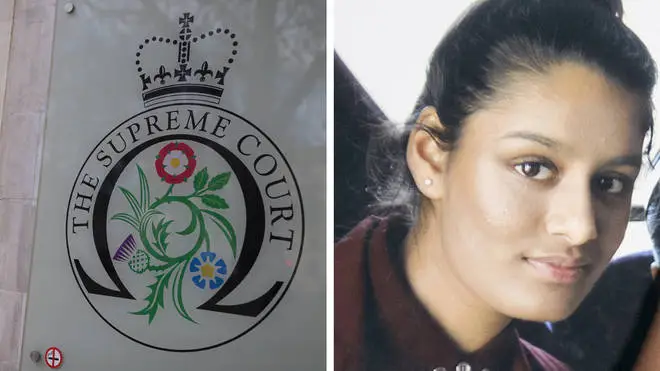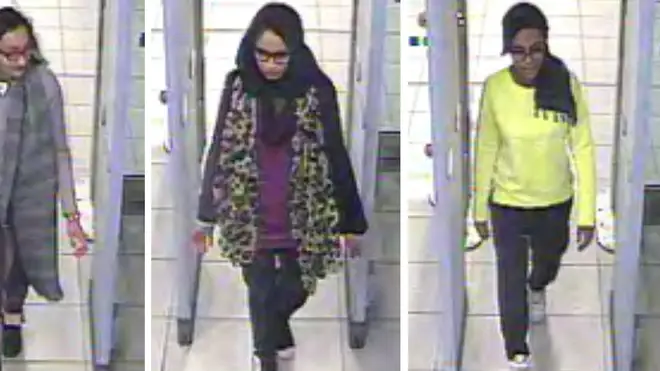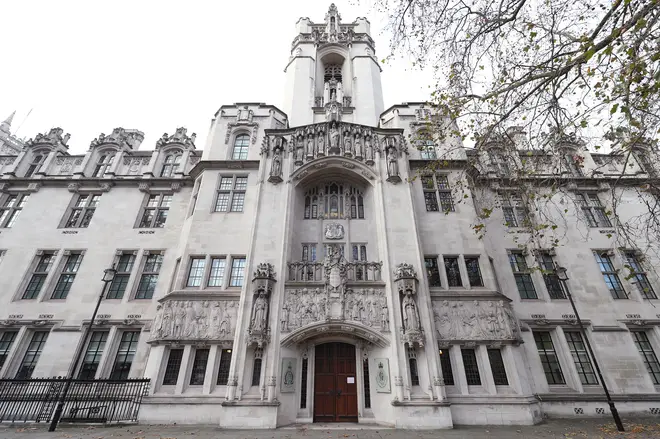
Nick Abbot 10pm - 1am
26 February 2021, 10:01 | Updated: 26 February 2021, 15:34

Shamima Begum cannot return to the UK to pursue an appeal against the removal of her British citizenship, the Supreme Court has ruled.
The UK's highest court ruled this morning that Ms Begum should not be granted leave to enter the UK to pursue her appeal against the deprivation of her British citizenship.
Announcing the decision, Lord Reed said: "The Supreme Court unanimously allows all of the Home Secretary's appeals and dismisses Ms Begum's cross-appeal."
Read more: Shamima Begum 'should make her appeal by Zoom'
Shamima, now 21, was one of three east London schoolgirls who travelled to Syria to join Islamic State in February 2015 when she was 15 years old.
Her British citizenship was revoked on national security grounds shortly after she was found, nine months pregnant, in a Syrian refugee camp in February 2019.

Ex MI6 boss: Shamima Begum should face 'tough justice' in the UK
In July last year, the Court of Appeal ruled that "the only way in which she can have a fair and effective appeal is to be permitted to come into the United Kingdom to pursue her appeal".
The Home Office challenged that decision at the Supreme Court in November, arguing that allowing her to return to the UK "would create significant national security risks" and expose the public to "an increased risk of terrorism".
Read more: Shamima Begum 'shouldn't be allowed back into the UK...make her appeal by Zoom'

Supreme Court rules Shamima Begum cannot return to UK
In the Supreme Court's written ruling, Lord Reed said: "It is, of course, true that a deprivation decision may have serious consequences for the person in question: although she cannot be rendered stateless, the loss of her British citizenship may nevertheless have a profound effect upon her life, especially where her alternative nationality is one with which she has little real connection.
"But the setting aside of the decision may also have serious consequences for the public interest.
"In such a case, it would be irresponsible for the court to allow the appeal without any regard to the interests of national security which prompted the decision in question, and it is difficult to conceive that the law would require it to do so."

Human rights group Liberty, which intervened in Ms Begum's case, said the Supreme Court's ruling sets "an extremely dangerous precedent".
Rosie Brighouse, a lawyer with Liberty, said: "The right to a fair trial is not something democratic governments should take away on a whim, and nor is someone's British citizenship.
"If a government is allowed to wield extreme powers like banishment without the basic safeguards of a fair trial it sets an extremely dangerous precedent.
Read more: War veteran tells LBC Shamima Begum returning to the UK would be an 'insult'
"The security services have safely managed the returns of hundreds of people from Syria but the Government has chosen to target Shamima Begum.
"This approach does not serve justice, it's a cynical distraction from a failed counter-terror strategy and another example of this Government's disregard for access to justice and the rule of law."
BREAKING
— Liberty (@libertyhq) February 26, 2021
Supreme Court has overturned previous ruling over Shamima Begum’s right to return to the UK to participate in her case.
The right to a fair trial protects all of us. Stripping someone’s citizenship without due process sets a dangerous precedent.
Sajid Javid, who as Home Secretary at the time took the decision to revoke Shamima Begum's British citizenship on national security grounds, welcomed the ruling.
He said: "I strongly welcome the Supreme Court's ruling on Shamima Begum. The Home Secretary is responsible for the security of our citizens and borders, and therefore should have the power to decide whether anyone posing a serious threat to that security can enter our country.
"There are no simple solutions to this situation but any restrictions of rights and freedoms faced by this individual are a direct consequence of the extreme actions that she and others have taken, in violation of government guidance and common morality."

The Supreme Court also criticised the Court of Appeal for its decision last year, ruling that it wrongly "made its own assessment of the requirements of national security and preferred it to that of the Secretary of State, despite the absence of any relevant evidence before it".
The judge added: "The Court of Appeal's approach did not give the Secretary of State's assessment the respect which it should have received, given that it is the Secretary of State who has been charged by Parliament with responsibility for making such assessments, and who is democratically accountable to Parliament for the discharge of that responsibility."